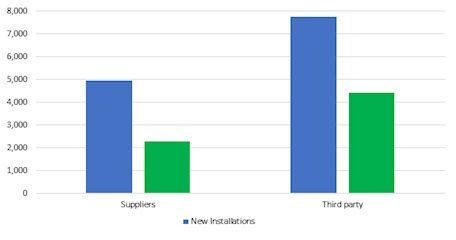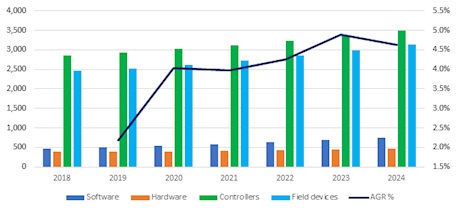Global BACS market resilience
Contents |
[edit] Introduction
As of February 2020, BSRIA’s research was pointing to sustained growth of 4% CAGR for the global Building Automation Controls (BACS) market up to 2024. This was before the emergence of the coronavirus as a significant global threat.
While it is still too early to assess the social or economic impact, there is likely to be at least some short to medium term effect. Against this, growing awareness of the likely serious impact of climate change should encourage investment in BACS in the medium to longer term, especially where this is encouraged by government intervention and regulation.
[edit] Market value update
The global BACS product market was valued at USD 6.3 billion in 2019 and accounts for around a third of the installed value of USD 19.4 billion. Some 14% is related to other products such as wiring and panels, while the remaining 55% was counted for by commissioning, installation, service and maintenance.
Service and maintenance on its own account for approximately 25% of the installed value of USD 19.4 billion. This makes it a major industry, larger than the current GDP of about 40% of the world’s countries.
[edit] Third party suppliers
63% of the BACS products are sold via third party, and of the remainder, 37% are installed by the supplier’s in-house contractors. Most of the large suppliers undertake installation work as well as service & maintenance in-house, but the business models tend to be country specific.
BSRIA has found evidence that in some countries, some of the larger suppliers are placing greater emphasis on services and consultancy as a means of establishing a deeper and more strategic relationship with the end client.
[edit] Growth projections
The global BACS product market is expected to grow by around 4% per year up to 2024 with decent evolution across all products segments and with software growing at twice that rate. The advance of software is boosted by increasing uptake of energy efficiency and analytics software as building managers seek to understand all aspects of their buildings’ performance so that they can manage it more effectively.
As the software and systems become more intelligent, they will increasingly be able to “self-manage” which will further aid building operators. If the systems are advanced enough to manage themselves to a greater degree, then so much the better.
BACS solutions are increasingly expanding out from their traditional role in managing HVAC to embrace other areas of building technology. Lighting, blinds, access controls, intrusion, surveillance cameras, fire notification etc. are gradually being added to BACS installations. The move towards the truly smart building, which optimises comfort and wellbeing as well as energy efficiency requires that these services ‘collaborate’ which is most likely to be achieved by working as part of a common system. The most commonly seen example at present is where HVAC, lighting and blinds are managed by a common system. In this scenario, blinds can be closed, and lighting adjusted as appropriate. This saves energy while creating better conditions within the building.
Similarly, coordinating HVAC systems with room booking systems and with presence detectors can ensure that rooms have the desired temperature and ventilation when needed, while minimising unnecessary heating or cooling.
While the wellbeing agenda is still in its early stages in most markets, in the longer term the advance of AI and growing expectations of what buildings can achieve is likely to see continued global growth of BACS and its gradual evolution into a true enabler of smart buildings.
This article was originally published as "Is the Global BACS Market Healthy Enough to Weather the Gathering Storm?" on the BSRIA website on March 2020.
Find out more at:
- America enquiries: http://www.bsria.com/us
- China enquiries: http://www.bsria.com.cn
- EMEA and all other enquiries: http://www.bsria.com/uk
--BSRIA
[edit] Related articles on Designing Buildings
- BACS building automation controls - the information revolution.
- BSRIA articles.
- BSRIA study shows uptake of convergence and IoT in commercial buildings.
- BSRIA.
- BSRIA World Building Automation and Control Systems 2022.
- Building Automation and Control System BACS.
- Building energy management systems BEMS.
- Building management systems.
- Building services.
- Commercial building automation market.
- Energy management and building controls.
- European BACS Market 2019 - 2024.
- Global building energy management systems market.
- Global study of challenges and opportunities in the BACS market.
Featured articles and news
Statement from the Interim Chief Construction Advisor
Thouria Istephan; Architect and inquiry panel member outlines ongoing work, priorities and next steps.
The 2025 draft NPPF in brief with indicative responses
Local verses National and suitable verses sustainable: Consultation open for just over one week.
Increased vigilance on VAT Domestic Reverse Charge
HMRC bearing down with increasing force on construction consultant says.
Call for greater recognition of professional standards
Chartered bodies representing more than 1.5 million individuals have written to the UK Government.
Cutting carbon, cost and risk in estate management
Lessons from Cardiff Met’s “Halve the Half” initiative.
Inspiring the next generation to fulfil an electrified future
Technical Manager at ECA on the importance of engagement between industry and education.
Repairing historic stone and slate roofs
The need for a code of practice and technical advice note.
Environmental compliance; a checklist for 2026
Legislative changes, policy shifts, phased rollouts, and compliance updates to be aware of.
UKCW London to tackle sector’s most pressing issues
AI and skills development, ecology and the environment, policy and planning and more.
Managing building safety risks
Across an existing residential portfolio; a client's perspective.
ECA support for Gate Safe’s Safe School Gates Campaign.
Core construction skills explained
Preparing for a career in construction.
Retrofitting for resilience with the Leicester Resilience Hub
Community-serving facilities, enhanced as support and essential services for climate-related disruptions.
Some of the articles relating to water, here to browse. Any missing?
Recognisable Gothic characters, designed to dramatically spout water away from buildings.
A case study and a warning to would-be developers
Creating four dwellings... after half a century of doing this job, why, oh why, is it so difficult?
Reform of the fire engineering profession
Fire Engineers Advisory Panel: Authoritative Statement, reactions and next steps.
Restoration and renewal of the Palace of Westminster
A complex project of cultural significance from full decant to EMI, opportunities and a potential a way forward.
Apprenticeships and the responsibility we share
Perspectives from the CIOB President as National Apprentice Week comes to a close.



























